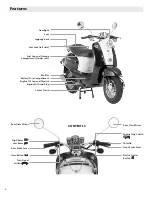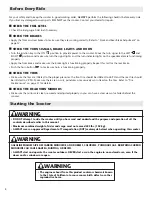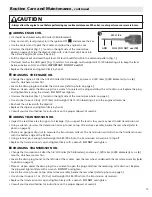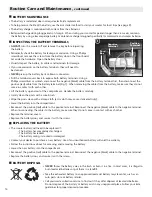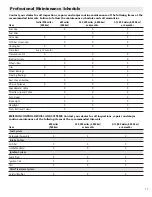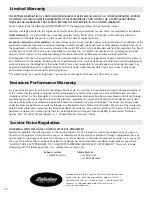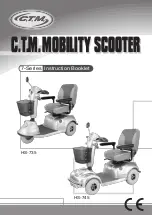
13
Routine Care and Maintenance,
continued
ADDING ENGINE OIL
• Oil should be checked every 300 miles (480 kilometers).
• Stop on smooth, level ground, turn the ignition OFF
and remove the key.
• Use the center stand to park the scooter and allow the engine to cool.
• Unscrew the dipstick (Fig. 1), found on the right side of the scooter (see
photo on page 4). Wipe the dipstick clean with a cloth and dip it back into
the oil reservoir (do not screw it back in).
• Pull the dipstick out and read the oil level. Oil level should fall within the diamond pattern (Fig. 1).
• If oil level reaches the ADD point (Fig. 1), add oil. Use enough multi-weight SAE 15/40 lubricating oil to keep the level
between between FULL and ADD.
IMPORTANT: DO NOT overfill.
• Replace the dipstick and tighten firmly by hand.
CHANGING THE ENGINE OIL
• Change the engine oil after the first 200 miles (320 kilometers), and every 2,500 miles (4,000 kilometers) or six (6)
months, whichever comes first.
• Locate the drain plug found under the crank case (refer to photo on page 4).
• Place an oil pan under the drain plug. Use a wrench to unscrew the plug and allow the oil to drain out. Replace the plug
and tighten firmly using the wrench.
DO NOT
overtighten.
• Unscrew the dipstick (Fig. 1), found on the right side of the scooter (see photo on page 4).
• Use a funnel to pour 0.8 qt. (0.75 liter) multi-weight SAE 15/40 lubricating oil into the engine oil reservoir.
• Re-check the oil level with the dipstick.
• Replace the dipstick and tighten firmly by hand.
• Consult your local authorities for instructions on the proper disposal of used oil.
ADDING TRANSMISSION OIL
• Inspect the rear drive area for signs of oil leakage. If you suspect the level is low, you may need to add transmission oil.
• Using a wrench, unscrew the transmission oil cap, found on top of rear drive assembly, beside the rear wheel (refer to
photo on page 5).
• There is no gauge or dip stick to measure the transmission oil level. The transmission oil is full when the fluid level is even
with the bottom edge of the fill hole.
• Using a funnel, pour enough multi-weight SAE 85/90 oil into the transmission oil reservoir to top off.
• Replace the transmission oil cap and tighten firmly with a wrench.
DO NOT
overtighten.
CHANGING TRANSMISSION OIL
• Change the transmission oil after the first 200 miles (320 kilometers), and every 2,500 miles (4,000 kilometers) or six (6)
months, whichever comes first.
• Locate the drain plug, found on the left side of the scooter, near the rear wheel, underneath the rear drive assembly (refer
to photo on page 5).
• Place an oil pan under the drain plug. Use a wrench to open the plug and allow the remaining oil to drain out. Replace
the plug and tighten firmly with a wrench.
DO NOT
overtighten.
• Locate the oil cap, found on top of rear drive assembly, beside the rear wheel (refer to photo on page 5).
• Use a funnel to pour 4.1 oz. (120 cc) multi-weight SAE 85/90 oil into the transmission oil reservoir.
• Replace the transmission oil cap and tighten firmly with a wrench.
DO NOT
overtighten.
• Consult your local authorities for instructions on the proper disposal of used oil.
1
DIPSTICK
ADD FULL (DO NOT overfill)
CAUTION
• Always allow the engine to cool before performing any routine maintenance. When hot, scooter parts can cause severe burns.






